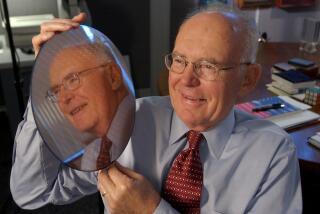Q & A
* Newport Beach patent lawyer Don W. Martens Don W. Martens, 61, a 30-year patent lawyer, is the new president of the American Intellectual Property Law Assn. Known as the AIPLA, the Washington-based organization is a professional group for attorneys specializing in law that covers patents, copyrights, trademarks and trade secrets. Since its formation in 1897, the group has had only one other president from the West Coast before Martens. A past president of the Orange County Bar Assn. and the Orange County and Los Angeles patent law associations, Martens spoke with Times correspondent Enrique Lavin from his office in Newport Beach. Q: What are your goals as president of the AIPLA?
A: We are working hard at increasing the effectiveness of the voice of intellectual property lawyers with Congress, the White House and internationally. . . . We’ve also been working with some of the inventor groups to get a better communication going. Much of our attention is on what’s called “harmonization,” a movement to make some of the patent laws all over the world as similar as possible.
Q: What is the importance of patent laws?
A: If you had no patent laws, every time you invented something copiers could come right on your tails. Then, pretty soon everyone becomes a copier and nobody becomes an innovator. When that happens you stop having progress. American individuals have always been strong on the innovation side. So you need to have protection in order to give them an incentive.
Q: Where is there the most dispute?
A: There is now a lot of controversy going on in the software field. To what extent should software be protected? Many people believe that software should be freely copied. But over the past five or six years there has been more recognition that they need protection to stimulate that innovation. In terms of copyright, the pirating of music tapes has been a serious problem. The laws are pretty weak in the underdeveloped countries.
Q: What about the medical industry?
A: There are a lot of medical equipment manufacturers in Southern California. There’s now a bill before Congress to make medical and surgical techniques not patentable. As an association, we are opposed to that. In general, doctors who have invented medical and surgical techniques have been very willing to license them for a royalty. They are not going to stop every other doctor from performing their process. But it’s much more profitable for them to license it to other doctors so they can get income from it.
Q: What attracted you to intellectual property law?
A: It’s a fascinating field. You are always dealing with people who are contributing to society rather than people who are in trouble.
More to Read
Inside the business of entertainment
The Wide Shot brings you news, analysis and insights on everything from streaming wars to production — and what it all means for the future.
You may occasionally receive promotional content from the Los Angeles Times.








